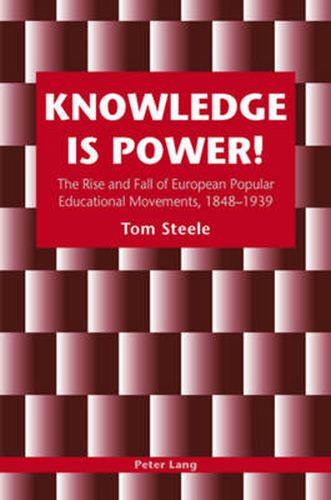Readings Newsletter
Become a Readings Member to make your shopping experience even easier.
Sign in or sign up for free!
You’re not far away from qualifying for FREE standard shipping within Australia
You’ve qualified for FREE standard shipping within Australia
The cart is loading…






This title is printed to order. This book may have been self-published. If so, we cannot guarantee the quality of the content. In the main most books will have gone through the editing process however some may not. We therefore suggest that you be aware of this before ordering this book. If in doubt check either the author or publisher’s details as we are unable to accept any returns unless they are faulty. Please contact us if you have any questions.
This study is the first extensive attempt to chart the rise and fall of popular educational movements across Europe following the 1848 revolutions to their demise at the outbreak of World War Two. It examines in detail the relationships between the educational, political and social aspirations of the emergent nationalist, workers’ and women’s movements, and the challenge to traditional intellectuals and academic knowledge. Following the emergence of the bourgeois public sphere in the early modern period, popular educational movements were central to the pursuit of democratic civil societies and also fertile ground for innovatory subjects of knowledge and interdisciplinary study, which have frequently reshaped the academic curriculum. Radical forms flourished, ranging from civic educational leagues to folk high schools, workers’ study circles, rationalist schools, Volksheims and university settlements that fed the demand for high-quality, socially relevant and politically charged education for adults. These stimulated radical social change, challenging the old empires and clerical domination. The study plots the cross-cultural influences at work and shows why some models were more palatable than others, drawing special attention to the rise of sociological positivism and anti-clericalism. It concludes by considering the contemporary global currents of renewal.
$9.00 standard shipping within Australia
FREE standard shipping within Australia for orders over $100.00
Express & International shipping calculated at checkout
This title is printed to order. This book may have been self-published. If so, we cannot guarantee the quality of the content. In the main most books will have gone through the editing process however some may not. We therefore suggest that you be aware of this before ordering this book. If in doubt check either the author or publisher’s details as we are unable to accept any returns unless they are faulty. Please contact us if you have any questions.
This study is the first extensive attempt to chart the rise and fall of popular educational movements across Europe following the 1848 revolutions to their demise at the outbreak of World War Two. It examines in detail the relationships between the educational, political and social aspirations of the emergent nationalist, workers’ and women’s movements, and the challenge to traditional intellectuals and academic knowledge. Following the emergence of the bourgeois public sphere in the early modern period, popular educational movements were central to the pursuit of democratic civil societies and also fertile ground for innovatory subjects of knowledge and interdisciplinary study, which have frequently reshaped the academic curriculum. Radical forms flourished, ranging from civic educational leagues to folk high schools, workers’ study circles, rationalist schools, Volksheims and university settlements that fed the demand for high-quality, socially relevant and politically charged education for adults. These stimulated radical social change, challenging the old empires and clerical domination. The study plots the cross-cultural influences at work and shows why some models were more palatable than others, drawing special attention to the rise of sociological positivism and anti-clericalism. It concludes by considering the contemporary global currents of renewal.